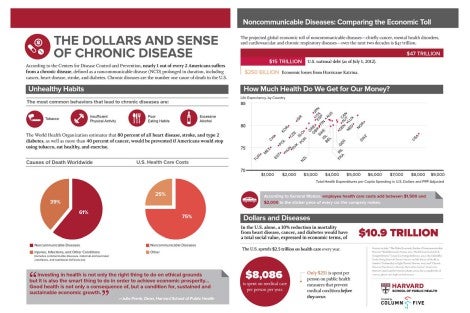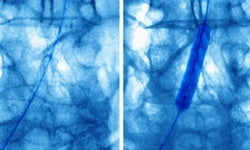Related Topics
Berries may lower women’s heart attack risk
A new study led by researchers from Harvard School of Public Health (HSPH) and the University of East Anglia finds that women who eat three or more servings of blueberries and strawberries each week may lower their risk of…

Foods identified as ‘whole grain’ not always healthy
New Standard Needed to Help Consumers, Organizations Choose Foods Rich in Whole Grains For immediate release: Thursday, January 10, 2013 Boston, MA – Current standards for classifying foods as “whole grain” are inconsistent and, in some cases, misleading,…

Infographic: The dollars and sense of chronic disease
According to the Centers for Disease Control and Prevention, nearly one out of every two Americans suffers from a chronic disease, defined as a noncommunicable disease (NCD) prolonged in duration, including cancer, heart disease, stroke, and diabetes. Chronic…

Non-communicable diseases threaten health of India’s population
As India makes development progress, it also faces a growing threat from non-communicable diseases (NCDs)—cardiovascular disease, cancer, chronic respiratory disease, diabetes, and mental health conditions. These NCDs—which many people don’t even realize they have—add to India’s already substantial…
Genetic risk for diabetes hurts heart health
Coverage in Huffington Post, October 17, 2012, featuring a study from HSPH.
Heart attack patients in states with public reporting less likely to receive angioplasty
For immediate release: Tuesday, October 9, 2012 Boston, MA — Patients entering hospitals with heart attacks in states with mandatory public reporting are less likely to receive angioplasties to fix heart blockages than patients in states without public…

Seven tips for losing weight—without dieting
By slowing down our eating and being more mindful of where our food comes from, we can shed extra pounds without following a particular diet, Lilian Cheung, lecturer in nutrition at Harvard School of Public Health (HSPH), wrote…
Blood type linked to heart disease risk
Heart disease risk may be linked to blood type, according to new Harvard School of Public Health (HSPH) research. Senior author Lu Qi, assistant professor in the Department of Nutrition, and colleagues found that people with blood types…
Men with prostate cancer more likely to die from other causes
Study Suggests Prostate Cancer Management Should Emphasize Healthy Lifestyle Changes Boston, MA – Men diagnosed with prostate cancer are less likely to die from the disease than from largely preventable conditions such as heart disease, according to a…

Stressful childhood events linked to elevated inflammation in adolescence
Children who experienced traumatic events such as abuse or parental separation before age 8 are more likely to show elevated levels of inflammation at ages 10 and 15, according to a new study led by Harvard School of…